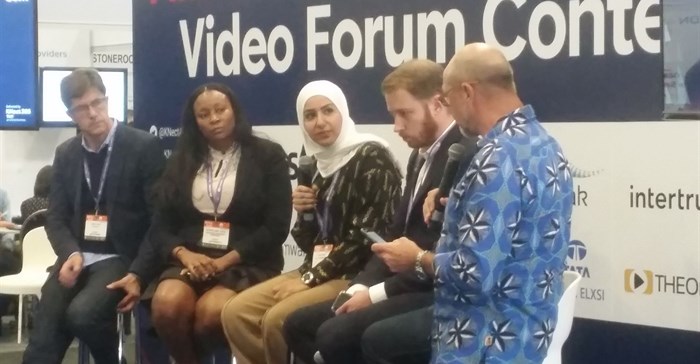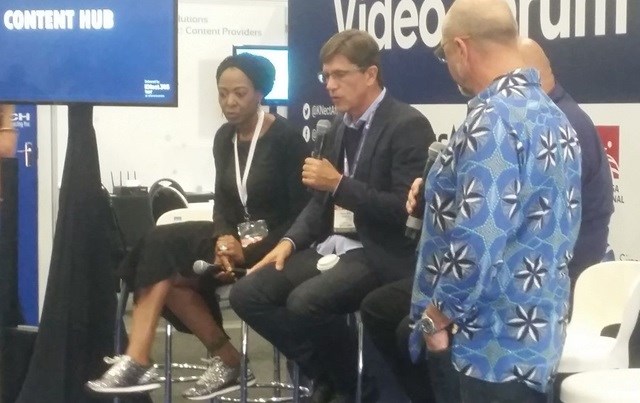The Africa Video Forum at #AfricaCom 2018, this year grappled with funding models for original content on the continent and the disruption that mobile brings.

Africa Video Forum, AfricaCom 2018.
AfricaCom is Africa’s largest technology, media and telecommunications conference and exhibition. The conference programme covered the most strategic issues affecting companies in Africa’s digital market: services, efficiency, profitability, customer experience, partnerships, policy and more.
This 21st edition of AfricaCom held in Cape Town 13–15 November 2018, attracted close to 14 000 record-breaking attendees this year with a diverse and informed audience. It also featured several co-located events: 5G Africa, Africa Video Forum, The AI Summit Cape Town, IoT World Africa and Mission Critical Technologies Africa.
Collaboration seemed to be the buzzword du jour at AfricaCom 2018, particularly in the broadcast and streaming content industry, where everyone is chasing the same diminishing pool of revenue.
Content hubs
In a discussion about how content producers need to be more adventurous and “break the mould”, Biola Alabi, the CEO BiolaAlabi Media based in Lagos, Nigeria, said it was imperative that content producers in Africa nurtured talent and provided a pipeline of global talent to change opportunities for all.
“We are storytellers, orators by nature, it is our culture, we don’t have to worry about that. We are working with writers from the whole continent. Content is coming from everywhere.
“We need to develop creative writing hubs across the continent… like we are developing tech hubs,” Alabi urged. “Writing is a global skill and if we are not able to retain that skill, it will leave us.”
The kind of ecosystem where there is a free flow of talent moving between broadcasters and independent producers accelerates trust and creates braver ideas, pointed out Duncan Irvine, founder and CEO of Rapid Blue.

#AfricaCom 2018 (L-R): Biola Alabi, CEO BiolaAlabi Media and Duncan Irvine, founder & CEO of Rapid Blue.
Elias Schulze, the co-founder of Kana TV in Ethiopia, said producing content in Africa was a partnership game. “We can’t produce more content without more advertising – collaboration is what the future holds for any broadcaster in Africa. We all need to work together.”
Irvine said writing workshops on the continent were a great place to start developing and nurturing talent. “But fundamentally what we need is opportunities to write. Writers write. It is a craft.”
Alabi admitted that in many places on the continent, there was a limit to how far you could go in exploring sexuality or political freedoms in movies or series, and these kinds of storylines did limit the places that people could go to as storytellers.
“There is a bit of self-censorship in the creative environment on the continent. As a broadcaster you are telling people they can’t do that. But I don’t think it is stopping people from being innovative,” she reflected.
Irvine said content he had produced had caused riots in Egypt; garnered fines elsewhere and caused a transmitter to be burnt down in Nigeria when he didn’t consider the impact of his content.
Added Alabi: “What is lacking is coproduction and collaboration. There is a huge opportunity for us to all collaborate and work together. The ecosystem is about people moving around from place to place. I have worked in international productions for many years and now in film production and in a consulting capacity, with this diversity of experience; you can serve different types of clients. I wish we could do more of that, so people’s experience is circular, not linear.”
Irvine agreed with Alabi and Schulze on more collaboration: “Let’s all work together. Don’t die with your idea because you can’t get it produced.”
Mobile
Mobile disruption was also a topic that came up often at AfricaCom this year. In a panel discussion on the future of free-to-air broadcasting in Africa, Botlenyana Mokhele, an ICASA councillor in South Africa, said that as much as digital migration was driven by satellite, broadband penetration was driven by mobile.
Namibian Cecil Nguvauva, SABA secretary general, said the challenge in Africa was to connect the CEOs in the boardroom to ‘the future’ which is being accelerated by technological innovation and mobile disruption. “We have a culture that puts out content to try reach out to different audiences. The challenge for us is gradually getting there. Don’t totally disregard the free-to-air broadcasting model.
Ethiopia’s Schulze said that as far as the digital wave was concerned for most free-to-air broadcasters in Africa, it was to push content online. “It is here… but not yet here. That is what is going on in digital! People are understandably nervous about digital, because this is the first time where digital entrepreneurs and consumers have the upper hand. Literally, where someone can take their iPhone and produce content of the quality of a top broadcaster from a few years ago.”
Nguvauva said the problem was free-to-air broadcasters were seen as equals to digital broadcasters in delivering quality and goods, but that was not a fair assumption, as they didn’t have the money to innovate and compete against the Netflix’s of this world.
President and CEO of Econet Media which owns Kwesé TV, Joseph Hundah, said free-to-air in Africa had two problems:
- Regulators are issuing too many licences and there is not enough advertising to fund it. There is too much fragmentation for the size of the market we have and that forces consolidation as players don’t have the opportunity to create quality content.
- Audience measurement: advertisers will put more dollars onto a platform where the advertiser is reaching many people. Regulators need to come up with proper audience measurement standards, like they did in South Africa and stop relying on relationships.
Inclusive growth
Commenting on the success of this year’s event, Tom Cuthell, event director at KNect365, organisers of AfricaCom, said: “The buzz around the entire AfricaCom precinct was tangible, as those attending and participating in shaping Africa’s digital future appear to agree the time has now come for less talk and more action in order to get things done. As organisers, we are pleased to have facilitated these conversations, presentations and exhibits and to play a role in Africa’s ongoing digital democracy.”
This actionable desire reflected throughout the more than 16 conference tracks with many speakers calling on regulators and policy makers to stop worrying about controlling what was already happening on the ground, and to create policy for what might be.
“Africa has room for inclusive growth, and while there have been some development results, they have not been optimal,” said Olabiyi Durojaiye, chairman at the Nigerian Communications Commission, further commenting that African countries needed to collaborate to cut down on the red tape to speed up exchange of ideas and progression.
Digital ecosystem
The world has big problems – for the people of Africa, climate change, lack of literacy, lack of connectivity, poverty, and so on, are some of the challenges faced on a daily basis. However, there is also huge opportunity. The #AfricaComChallenge created at AfricaCom is therefore for corporate Africa to identify and mentor at least one start-up that can feed into the great digital ecosystem that can overcome these challenges and with a view to even presenting these solutions at the AHUB next year.
The #AfricaComChallenge sets the scene for a robust AfricaCom 2019 and in reinforcing the new era of dynamism and action that was born at AfricaCom 2018.





























